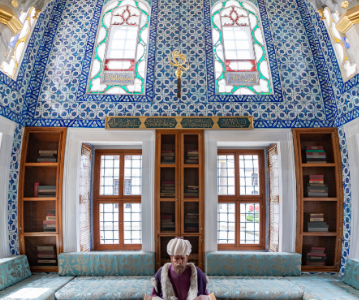In our religion, some obligations are lifted once they are performed once a year or once in a lifetime. However, we are commanded to establish the prescribed Prayer five times a day. What is the wisdom behind performing the Daily Prayers at five specific times each day?
The Qur’an states that the universe was created in six days: “We assuredly created the heavens and the earth and all that is between them in six days, and nothing of fatigue touched us.” (Qaf, 50:38). Another verse highlights that a “day” with God is unlike our days: “… a day with your Lord is like a thousand years in your reckoning.” (Al-Hajj, 22:47). The Sage Bediüzzaman interprets this not as the creation’s first six days, but as the time from the first creation to the Day of Judgment spanning six periods.[1] In the “Ninth Word,” Fourth Point, he discusses the seconds and minutes of this world—days and nights as seconds, years as minutes, phases of human life as hours, and the world’s epochs as days.
For example, the time of the Fajr (Dawn) Prayer recalls the beginning of spring after winter, the moment a human is conceived, and the first day of the universe’s six-day creation. The time for the Morning Prayer heralds all auspicious beginnings.[2]
The Dhuhr (Noon) Prayer corresponds to the middle of summer when fruits mature and cover the branches, the peak of youth, and the creation of mankind (Adam). Thus, the Noon Prayer time corresponds to the second day of the six-day creation of the earth and heavens. At noon, everything reaches its peak. Seasons achieve perfection with the full ripening of fruits, and humans reach their goals with the dynamism and efforts of youth. Finally, with the creation of man, the universe finds its perfection.
The Asr (Afternoon) Prayer is akin to the autumn season, the time of old age in human life, and the Prophet’s (peace be upon him) Era of Bliss.[3] As summer ends and autumn arrives, mature fruits either are consumed or decay. Similarly, humans reach old age. The Afternoon Prayer time, coinciding with the third day of creation, signifies the old age of the world. Thus, at the Asr, everything inclines towards decline (ending). The sorrow this time brings stems from our realization of the transient nature of events and objects.
The Maghrib (Evening) Prayer reminds us of the death of many beings at the end of autumn, human death, and the world’s desolation at the onset of the apocalypse, waking us from the slumber of heedlessness. The Evening Prayer time corresponds to the fourth day when the apocalypse will occur. At this time, everything declines and bids farewell. Plants, animals, humans, jinn, angels, and spiritual beings die, even the sun, which has never set since creation, sets. At this evening time, humans turn away from all declines and turn only to the Lord, the only being who does not perish.
The Isha (Night) Prayer symbolizes the night’s black shroud covering the day, winter’s white shroud covering the dead earth, the disappearance of the traces left by a deceased person, and the complete closure of the world as a place of trial. The traces left after sunset are hidden by darkness at night.[4] The traces of fallen autumn leaves are covered with snow. Human traces left in the world are forgotten. With the apocalypse, the debris of the world that had perished vanishes, and this time corresponds to the fifth day.
With the end of Isha time, our life in this world, corresponding to five days, also ends. However, we have a sixth day in our life in the Barzakh (the Intermediate Realm). Therefore, we add the Tahajjud Prayer to our five Daily Prayers for this sixth day.
Nighttime reminds us of winter, the grave, and the realm of the Barzakh, reminding us of our utter dependence on the Merciful. The Tahajjud at night is a necessary light during the dark night of the grave and the Barzakh. The sixth day corresponds to the period of Barzakh. The second dawn then reminds us of resurrection.
Thus, each Prayer time has its mysterious meaning and wisdom. Prayer takes a person on a journey from birth to death and to the realm of Barzakh daily, reminding them of the transience of life. It shows how suitable the obligatory Prayers in these times are to human nature, in glorifying, praising, and proclaiming the greatness of God Almighty!
[1] Emine Eroğlu, “Dokuzuncu Söz, (4) Doğrusal zaman ve helezonik zaman tasavvurları – Zamanın daireleri ve namazla bölünmesi”, Kardelen, 1 Haziran 2018, www.youtube.com/watch?v=kRNQmU_y7qg
[2] Emine Eroğlu, “Dokuzuncu Söz, (5) Sabah namazı vakti başlangıçları, öğle namazı vakti kemâlâtı hatırlatır”, Kardelen, 8 Haziran 2018, www.youtube.com/watch?v=6ZlpkPgL0ds
[3] Emine Eroğlu, “Dokuzuncu Söz, (6) İkindi namazı vakti sona erme eğilimini, akşam namazı vakti ölümü ve sonları hatırlatır”, Kardelen, 22 Haziran 2018, www.youtube.com/watch?v=5RPh7CgXxMo&t=940s
[4] Emine Eroğlu, Dokuzuncu Söz, (7) Yatsı namazı vakti tamamen unutulmayı, teheccüd namazı vakti berzah hayatını hatırlatır”, Kardelen, 29 Haziran 2018, www.youtube.com/watch?v=2olRSM7sDwk




